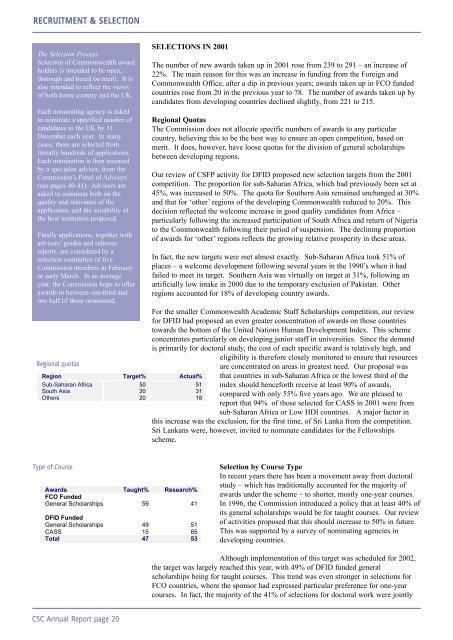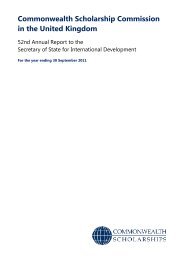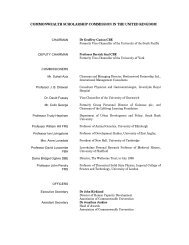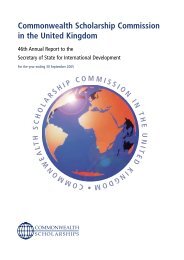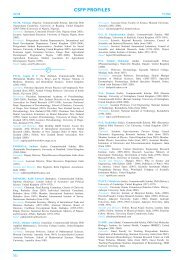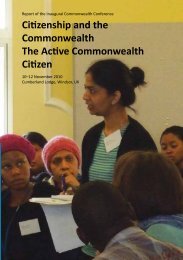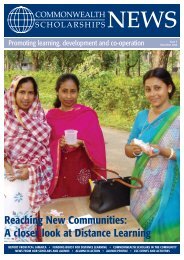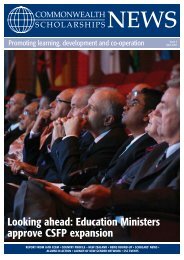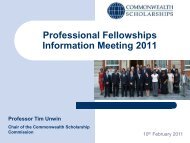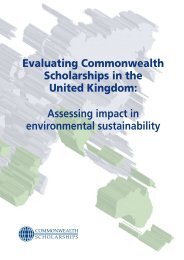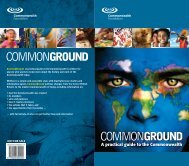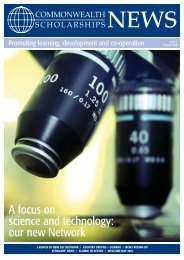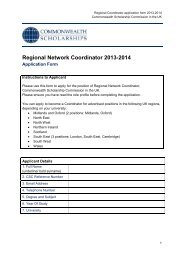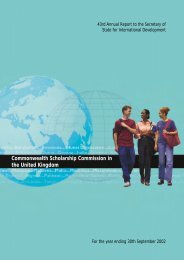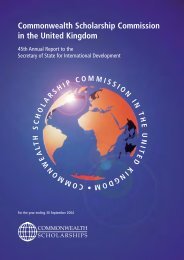42nd Annual Report - Commonwealth Scholarship Commission in ...
42nd Annual Report - Commonwealth Scholarship Commission in ...
42nd Annual Report - Commonwealth Scholarship Commission in ...
You also want an ePaper? Increase the reach of your titles
YUMPU automatically turns print PDFs into web optimized ePapers that Google loves.
RECRUITMENT & SELECTION<br />
The Selection Process<br />
Selection of <strong>Commonwealth</strong> award<br />
holders is <strong>in</strong>tended to be open,<br />
thorough and based on merit. It is<br />
also <strong>in</strong>tended to reflect the views<br />
of both home country and the UK.<br />
Each nom<strong>in</strong>at<strong>in</strong>g agency is asked<br />
to nom<strong>in</strong>ate a specified number of<br />
candidates to the UK by 31<br />
December each year. In many<br />
cases, these are selected from<br />
literally hundreds of applications.<br />
Each nom<strong>in</strong>ation is then assessed<br />
by a specialist adviser, from the<br />
<strong>Commission</strong>’s Panel of Advisers<br />
(see pages 40-41). Advisers are<br />
asked to comment both on the<br />
quality and relevance of the<br />
application, and the suitability of<br />
the host <strong>in</strong>stitution proposed.<br />
F<strong>in</strong>ally applications, together with<br />
advisers’ grades and referees<br />
reports, are considered by a<br />
selection committee of five<br />
<strong>Commission</strong> members <strong>in</strong> February<br />
or early March. In an average<br />
year, the <strong>Commission</strong> hope to offer<br />
awards to between one-third and<br />
one half of those nom<strong>in</strong>ated.<br />
Regional quotas<br />
SELECTIONS IN 2001<br />
Region Target% Actual%<br />
Sub-Saharan Africa 50 51<br />
South Asia 30 31<br />
Others 20 18<br />
The number of new awards taken up <strong>in</strong> 2001 rose from 239 to 291 – an <strong>in</strong>crease of<br />
22%. The ma<strong>in</strong> reason for this was an <strong>in</strong>crease <strong>in</strong> fund<strong>in</strong>g from the Foreign and<br />
<strong>Commonwealth</strong> Office, after a dip <strong>in</strong> previous years; awards taken up <strong>in</strong> FCO funded<br />
countries rose from 20 <strong>in</strong> the previous year to 78. The number of awards taken up by<br />
candidates from develop<strong>in</strong>g countries decl<strong>in</strong>ed slightly, from 221 to 215.<br />
Regional Quotas<br />
The <strong>Commission</strong> does not allocate specific numbers of awards to any particular<br />
country, believ<strong>in</strong>g this to be the best way to ensure an open competition, based on<br />
merit. It does, however, have loose quotas for the division of general scholarships<br />
between develop<strong>in</strong>g regions.<br />
Our review of CSFP activity for DFID proposed new selection targets from the 2001<br />
competition. The proportion for sub-Saharan Africa, which had previously been set at<br />
45%, was <strong>in</strong>creased to 50%. The quota for Southern Asia rema<strong>in</strong>ed unchanged at 30%<br />
and that for ‘other’ regions of the develop<strong>in</strong>g <strong>Commonwealth</strong> reduced to 20%. This<br />
decision reflected the welcome <strong>in</strong>crease <strong>in</strong> good quality candidates from Africa –<br />
particularly follow<strong>in</strong>g the <strong>in</strong>creased participation of South Africa and return of Nigeria<br />
to the <strong>Commonwealth</strong> follow<strong>in</strong>g their period of suspension. The decl<strong>in</strong><strong>in</strong>g proportion<br />
of awards for ‘other’ regions reflects the grow<strong>in</strong>g relative prosperity <strong>in</strong> these areas.<br />
In fact, the new targets were met almost exactly. Sub-Saharan Africa took 51% of<br />
places – a welcome development follow<strong>in</strong>g several years <strong>in</strong> the 1990’s when it had<br />
failed to meet its target. Southern Asia was virtually on target at 31%, follow<strong>in</strong>g an<br />
artificially low <strong>in</strong>take <strong>in</strong> 2000 due to the temporary exclusion of Pakistan. Other<br />
regions accounted for 18% of develop<strong>in</strong>g country awards.<br />
For the smaller <strong>Commonwealth</strong> Academic Staff <strong>Scholarship</strong>s competition, our review<br />
for DFID had proposed an even greater concentration of awards on those countries<br />
towards the bottom of the United Nations Human Development Index. This scheme<br />
concentrates particularly on develop<strong>in</strong>g junior staff <strong>in</strong> universities. S<strong>in</strong>ce the demand<br />
is primarily for doctoral study, the cost of each specific award is relatively high, and<br />
eligibility is therefore closely monitored to ensure that resources<br />
are concentrated on areas <strong>in</strong> greatest need. Our proposal was<br />
that countries <strong>in</strong> sub-Saharan Africa or the lowest third of the<br />
<strong>in</strong>dex should henceforth receive at least 90% of awards,<br />
compared with only 55% five years ago. We are pleased to<br />
report that 94% of those selected for CASS <strong>in</strong> 2001 were from<br />
sub-Saharan Africa or Low HDI countries. A major factor <strong>in</strong><br />
this <strong>in</strong>crease was the exclusion, for the first time, of Sri Lanka from the competition.<br />
Sri Lankans were, however, <strong>in</strong>vited to nom<strong>in</strong>ate candidates for the Fellowships<br />
scheme.<br />
Type of Course<br />
Awards Taught% Research%<br />
FCO Funded<br />
General <strong>Scholarship</strong>s 59 41<br />
DFID Funded<br />
General <strong>Scholarship</strong>s 49 51<br />
CASS 15 85<br />
Total 47 53<br />
Selection by Course Type<br />
In recent years there has been a movement away from doctoral<br />
study – which has traditionally accounted for the majority of<br />
awards under the scheme – to shorter, mostly one-year courses.<br />
In 1996, the <strong>Commission</strong> <strong>in</strong>troduced a policy that at least 40% of<br />
its general scholarships would be for taught courses. Our review<br />
of activities proposed that this should <strong>in</strong>crease to 50% <strong>in</strong> future.<br />
This was supported by a survey of nom<strong>in</strong>at<strong>in</strong>g agencies <strong>in</strong><br />
develop<strong>in</strong>g countries.<br />
Although implementation of this target was scheduled for 2002,<br />
the target was largely reached this year, with 49% of DFID funded general<br />
scholarships be<strong>in</strong>g for taught courses. This trend was even stronger <strong>in</strong> selections for<br />
FCO countries, where the sponsor had expressed particular preference for one-year<br />
courses. In fact, the majority of the 41% of selections for doctoral work were jo<strong>in</strong>tly<br />
CSC <strong>Annual</strong> <strong>Report</strong> page 20


